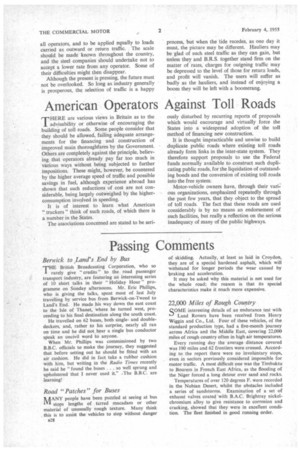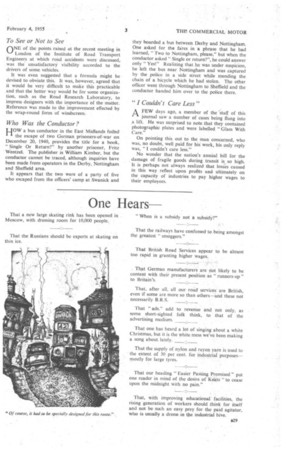Passing Comments
Page 36

Page 37

If you've noticed an error in this article please click here to report it so we can fix it.
Berwick to Land's End by Bus
THE British Broadcasting Corporation, who so I rarely give " credits " to the road passenger transport industry, are featuring an interesting series of 10 short talks in their "Holiday Hour" programme on Sunday afternoons. Mr. Eric Phillips, who is giving the talks, spent most of last July travelling by service bus from Berwick-on-Tweed to Land's End. He made his way down the east coast to the Isle of Thanet, where he turned west, proceeding to his final destination along the south coast. He travelled on 62 buses, both singleand doubledeckers, and, rather to his surprise, nearly all ran on time and he did not hear a single bus conductor speak an uncivil word to anyone.
When Mr. Phillips was commissioned by two B.B.C. officials to make the journey, they suggested that before setting out he should be fitted with an air cushion. He did in fact take a rubber cushion with him, but writing in the Radio Times recently he said he "found the buses. . . so well sprung and upholstered that I never used it." The B.B.C. are learning!
Road "Patches" for Buses
MANY people have been puzzled at seeing at bus stops lengths of tarred macadam or other material of unusually rough texture. Many think this is to assist the vehicles to stop without danger
s28 of skidding. Actually, at least as laid in Croydon, they are of a special hardened asphalt, which will withstand for longer periods the wear caused by braking and acceleration.
It may be asked why this material is not used for the whole road; the reason is that its special characteristics make it much more expensive.
22,000 Miles of Rough Country qomE interesting details of an endurance test with SOME
Rovers have been received from Henry Wiggin and Co., Ltd. Four of these vehicles, of the standard production type, had a five-month journey across Africa and the Middle East, covering 22,000 miles of rough country often in high air temperature& Every running day the average distance covered was 190 miles and 62 frontiers were crossed. According to the report there were no involuntary stops, even in sectors previously considered impossible for motor traffic. A most difficult one was the Timbuktu to Bourem in French East Africa, as the flooding of the Niger forced a long detour over sand and rocks.
Temperatures of over 120 degrees F. were recorded in the Nubian Desert, whilst the obstacles included a series of sandstorms. Examination of a set of exhaust valves coated with B.A.C. Brightray nickelchromium alloy to give resistance to corrosion and cracking, showed that they were in excellent condition. The fleet finished in good running order.
To See or Not to See
ONE of the points, raised at the recent meeting in London of the Institute of Road Transport Engineers at which road accidents were discussed, was the unsatisfactory visibility accorded to the drivers of some vehicles.
It was even suggested that a formula might be devised to obviate this. It was, however, agreed that it would be very difficult to make this practicable and that the better way would be for some organization, such as the Road Research Laboratory, to impress designers with the importance of the matter. Reference was made to the improvement effected by the wrap-round form of windscreen.
Who Was the Conductor ?
How a bus conductor in the East Midlands foiled
the escape of two German prisoners-of-war on December 20, 1940, provides the title for a book, "Single Or Return?" by another prisoner, Fritz Wentzet. The publisher is William Kimber, but the conductor cannot be traced, although inquiries have been made from operators in the Derby, Nottingham and Sheffield area.
It appears that the two were of a party of five who escaped from the officers' camp at Swanick and
they boarded a bus between Derby and Nottingham. One asked for the fares in a phrase that he had learned, "Two to Nottingham, please," but when the conductor asked Single or return?", he could answer only "Yes!" Realizing that he was under suspicion, he left the bus near Nottingham and was captured by the police in a side street while mending the chain of a bicycle which he had stolen. The other officer went through Nottingham to Sheffield and the conductor handed him over to the police there.
"I Couldn't Care Less"
AFEW days ago, a member of the -staff of this
journal saw a number of cases being flung into ,a lift. He was surprised to note that they contained photographic plates and were labelled "Glass With Care."
On pointing this out to the man concerned, who was, no doubt, well paid for his work, his only reply was, "I couldn't care less."
No wonder that the nation's annual bill for the • damage of fragile goods during transit is so high. It is perhaps not always realized that losses caused in this way reflect upon profits and ultimately on the capacity of industries to pay higher wages to their employees.




















































































































